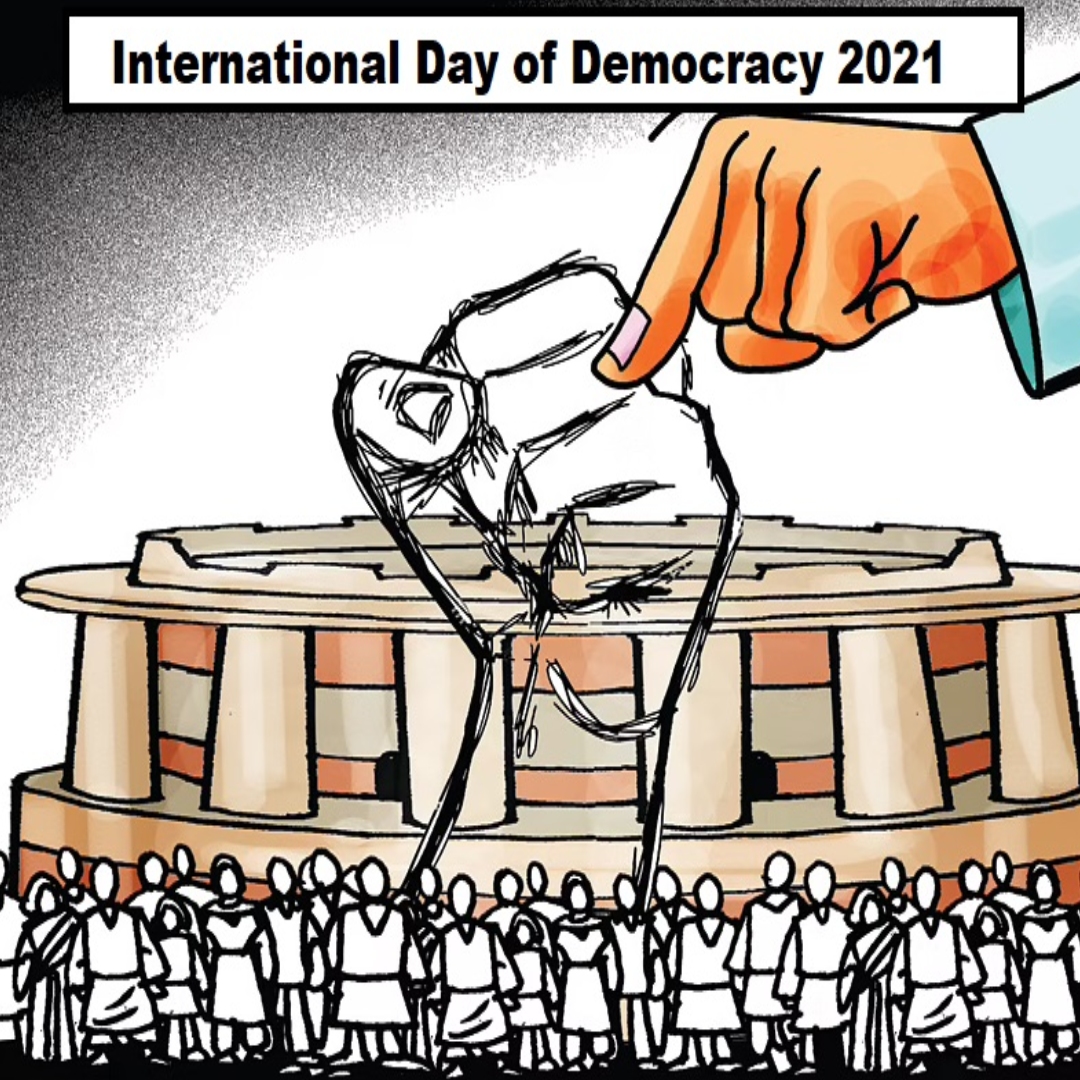
Image Credits: Jagran Josh
International Democracy Day: How Democracy When Compared With Religion Can Impact Its Functioning
Writer: Abbas Rizvi
He is a voracious reader who likes to read about the world. Research and Fact Checking are his area of work. He likes to think before speaking.
India, 15 Sep 2021 1:54 PM GMT
Editor : Ankita Singh |
A literature lover who likes delving deeper into a wide range of societal issues and expresses her opinions about the same. Keeps looking for best-read recommendations while enjoying her coffee and tea.
Creatives : Ankita Singh
A literature lover who likes delving deeper into a wide range of societal issues and expresses her opinions about the same. Keeps looking for best-read recommendations while enjoying her coffee and tea.
International Democracy Day is celebrated annually on 15 September. This year the theme is "strengthening democratic resilience in the face of future crises."
International Democracy Day is celebrated annually on 15 September. This year the theme is "strengthening democratic resilience in the face of future crises." Celebrated in 2008 for the first time, many governments then decided to educate the world about the importance of Democracy since then.
United Nations General Assembly (UNGA) passed a resolution in 2007 to establish this particular day, create awareness regarding the different kinds of democracies, and uphold the principles of Democracy in the 21st century, Democracy is divide into four categories, Full Democracies, Flawed Democracies, Hybrid regimes and Authoritarian regimes. There are around 23 countries that are fully democratic,52 are flawed democracies, 35 are hybrid regimes, and 57 are authoritarian regimes.
On this International Democracy day 2021, it is essential to understand the difference between a fully democratic country and a hybrid regime in which religion/authoritarianism plays a vital role in running a particular country.
Norway Versus Pakistan
According to Democracy Index 2020, Norway is Ranked Number 1 country out of 167 countries ( 165 independent states and two territories ) a fully democratic country and Pakistan, which falls under the category of Hybrid regime, is ranked 105 out of 167 countries. The overall score for Norway is 9.81/10.00, whereas, for Pakistan, the score stands at 4.31/10.00, which is exceptionally low.
The four most important categories under which countries are scored are the electoral process, pluralism, functioning of government, political participation, political culture and civil liberties. According to the Freedom House report, the oldest American organization committed to supporting and defending Democracy worldwide, Pakistan is a partly free country. In contrast, Norway is considered to be a free country.
Political Rights
Imran Khan, the current Prime Minister of Pakistan, became in 2018 when the Tehreek-e-Insaf party formed a coalition government. It is considered the largest political party in the National Assembly. During polls, observers noticed a joint effort by elements of the country's military and judicial system to hamper the Pakistan Muslim League to increase the chances of Imran khan winning with the parliamentary majority. It includes corruption, contempt of court, terrorism and charges against opposition leaders. It was also observed that media was pressurized that ignored the coverage of opposition campaigns.
In 2020 opposition parties claimed that Khan was selected by the army, not through a fair election process. Whereas in Norway, parliament has 169 members who are directly elected for four-year terms through a unique system of fair representation in multi-member districts, an election monitoring mission from the OSCE (Organization for security and co-operation in Europe) 2017 elections were well conducted, offering notable praise for the country's quick voting methods.
Civil Liberties
Freedom of Expression highly lacks in Pakistan in 2020, and the government has targeted various independent journalists, television programs and stations. Four journalists were murdered in unexplained circumstances, and the military prohibits access to certain areas by the government. The so-called constitutional working country guarantees religious freedom to the minorities. Hindus have complained of forced conversions and kidnapping.
Some continue to flee to India, members of the Shia community and Christians remain at risk of blasphemy accusations; these laws and some hardcore fanatics have also curtailed the freedom of Muslims. In December 2020, a violent mob destroyed a Hindu temple in the Karak District of Khyber Pakhtunkhwa province. Members of the Ahmadi community are legally prohibited from calling themselves Muslims and face a lot of discrimination, and four Ahmadis are killed in 2020 hate crimes.
In Norway, freedom of expression is constitutionally guaranteed and generally respected in practice all around the country. The people of Norway have access to a different number of independent media outlets, which falls into many varieties, in 2017 the European Court of Human Rights (ECHR) ruled out that the Norwegian government cannot compel a journalist to reveal their private sources, even if the source has come forward independently even then.
In August 2020, the Norway journalist association, Verdens Gang and the Norwegian Editors Association sued the attorney general for denying access to documents in a case concerning police handling guns, freedom of religion is generally protected by the constitution, some hate crimes do occur, the government has launched an action plan against discrimination of Muslims, which includes requirements for police to register anti-Muslim crimes separately. All generally respect academic freedom, and private discussions in Norway are free and vibrant.
Democracy is considered the best form of government and has proven the best way to form and protect individual rights for any particular group or individual. Democracy gives the freedom to experiment with the structure, which is impossible if one man or a particular religion runs a country. Such structures, in the end, lead to violence and various other kinds of uncertainties that are dangerous for a particular state's future.
Also Read: India Downgraded From 'Free' To 'Partly Free' In Global Democracy Report
 All section
All section













